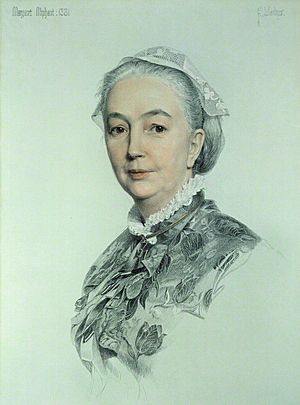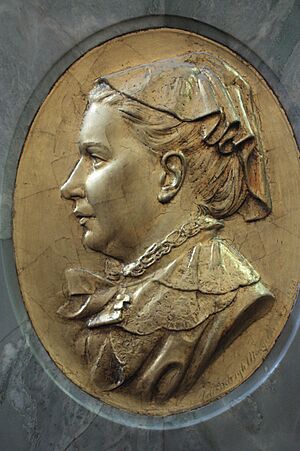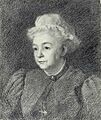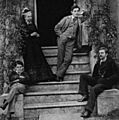Margaret Oliphant facts for kids
Quick facts for kids
Margaret Oliphant
|
|
|---|---|

An 1881 sketch
|
|
| Born | Margaret Oliphant Wilson 4 April 1828 Wallyford, Scotland |
| Died | 20 June 1897 (aged 69) Wimbledon, London, England |
| Genre | Romance |
| Signature | |
Margaret Oliphant Wilson Oliphant (born Margaret Oliphant Wilson; 4 April 1828 – 20 June 1897) was a Scottish writer. She wrote many novels and historical books. People often knew her as Mrs. Oliphant. Her stories included "domestic realism" (about everyday life), historical novels, and even tales about ghosts and the supernatural.
Contents
Margaret Oliphant: A Scottish Writer
Her Early Life and First Books
Margaret was born in Wallyford, Scotland, in 1828. She was the youngest child of Margaret Oliphant and Francis W. Wilson. She grew up in different places like Lasswade, Glasgow, and Liverpool. There's even a street named after her in Wallyford called Oliphant Gardens.
From a young age, Margaret loved to write and was always trying out new stories. Her first novel, Passages in the Life of Mrs. Margaret Maitland, was published in 1849. This book was about the Scottish Free Church movement, which her parents supported.
In 1851, her book Caleb Field came out. That same year, she met a publisher named William Blackwood. He invited her to write for Blackwood's Magazine, a famous magazine. She wrote over 100 articles for them throughout her life.
Facing Challenges and Becoming a Full-Time Writer
In May 1852, Margaret married her cousin, Frank Wilson Oliphant. He was an artist who worked with stained glass. They moved to London. Sadly, three of their six children died when they were very young.
Her husband became ill with tuberculosis. To help him, they moved to warmer places like Florence and Rome. But he passed away in Rome in 1859. This meant Margaret needed to earn money to support her three remaining children. She returned to England and focused on writing to provide for her family.

A Life of Hard Work and Sadness
Margaret became a very popular writer. She worked incredibly hard to keep writing and publishing. However, her personal life continued to be difficult. In 1864, her only daughter, Maggie, died in Rome. She was buried next to her father.
Soon after, Margaret's brother, who lived in Canada, lost all his money. Margaret welcomed him and his children into her home. This added even more responsibilities to her already busy life.
In 1866, she moved to Windsor to be close to her sons, who were studying at Eton. She lived in Windsor for the rest of her life. Her cousin, Annie Louisa Walker, also came to live with her and help around the house.
Margaret kept writing for over 30 years. But her hopes for her sons did not come true. Her elder son, Cyril Francis, died in 1890. Her younger son, Francis (who she called "Cecco"), also passed away in 1894. After losing all her children, Margaret lost much of her interest in life. Her health got worse, and she died in Wimbledon in 1897. She was buried in Eton next to her sons.
Her Amazing Stories and Books
Margaret Oliphant wrote more than 120 books! These included novels, travel books, history books, and literary reviews.
Novels and Ghost Stories
Some of her most famous novels include the "Chronicles of Carlingford" series, like Miss Marjoribanks. She also wrote Hester.
She also wrote many supernatural stories, which are like ghost stories. Some well-known ones are A Beleaguered City (1880) and short tales like "The Open Door" and "Old Lady Mary". She also wrote historical novels, such as Magdalen Hepburn (1854), which was set during the Scottish Reformation and featured Mary, Queen of Scots.
Biographies and History Books
Margaret Oliphant wrote biographies, which are life stories of real people. She wrote about famous figures like Edward Irving, Richard Brinsley Sheridan, Dante, and Miguel de Cervantes.
She also wrote many historical books. These included Historical Sketches of the Reign of George II (1869) and books about famous cities like The Makers of Florence (1876), The Makers of Venice (1887), and The Makers of Modern Rome (1895).
Why Her Books Are Still Read Today
After she died, people didn't read Margaret Oliphant's books as much for a while. But in the 1980s, publishers like Alan Sutton and Virago Press helped bring her work back into popularity. They focused on her Carlingford series.
In 1999, Penguin Books published a new edition of Miss Marjoribanks. In 2003, Hester was reissued. More recently, in 2010, the British Library and Persephone Books re-released The Mystery of Mrs. Blencarrow.
Her stories have even been adapted for BBC Radio 4. Miss Marjoribanks, Phoebe Junior, and Hester have all been turned into radio plays. This shows that her stories are still enjoyed by many people today!
Images for kids
 | Aaron Henry |
 | T. R. M. Howard |
 | Jesse Jackson |






